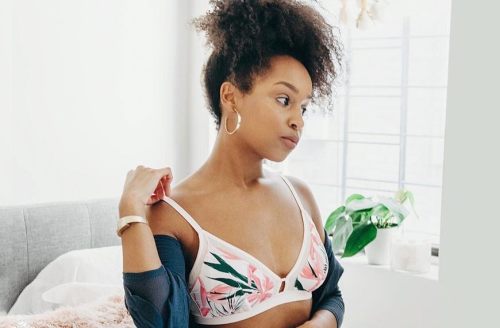In recent years, the fashion tide has blessedly turned to be more inclusive, not only featuring a much broader range of sizes, skin tones, and genders, but also celebrating what used to be considered flaws such as acne and cellulite. Chances are you’ve showed your appreciation by double-tapping body positive yogis or someone making artful constellations out of pimples. But how is body positivity and acceptance affecting the fashion industry? Is it strong enough to change the multi-billion dollar industry long fronted by Photoshopped models?
It’s definitely something brands have thankfully been doing. The fashion industry is slowly changing for the better. Certain clothing brands are expanding their sizing, and some campaigns have strived to include less Photoshopped images of diversely sized models that are more representative of the way people actually look. But according to “leisurée” provider Lively, customers only recently have begun to show a preference for “real women” in photo campaigns as opposed to models with society’s “ideal” body shape.
For the uninitiated, Lively is a lingerie brand behind obsession-inducing comfortable and supportive bras and bralettes that I have personally waxed poetic about several times. The brand has found success by epitomizing inclusivity through its ethos, campaign imagery, and sizing—highlighting its community and customers.
Lively founder and CEO Michelle Cordeiro Grant tells Fast Company that when she launched her brand in 2016, data showed that customers found photos of models more compelling. At the time, the company—which opened by offering a range of 26 sizes from 34A to 38DDD in order to “create a community of women who are all different shapes, sizes, and backgrounds”—sought to drive its inclusive message home by featuring women from its community in its campaigns. Unfortunately, customers didn’t respond the way Lively expected.
“Today our customers are far more likely to purchase products highlighted by the women in our community.” —Lively founder and CEO Michelle Cordeiro Grant
But recently (thankfully!), the tide has changed. Grant says that customers are 50 percent more interested in photos of non-models now than they were in 2016. “Two years later, we see that our community responds better to our campaigns that spotlight women in our community due to a shift in the dynamic and mind-set that our customers have,” Grant says. “Today our customers are far more likely to purchase products highlighted by the women in our community.”
Lively isn’t the only brand that is starting to see its dedication to body positivity pay off. American Eagle Outfitters’ underwear brand Aerie—which in 2014 committed to unretouched photos and launched a body-positivity campaign #AerieReal—has seen a 38 percent increase in its same-store sales for the first quarter this year, a spike Business Insider suspects is due its inclusive advertising. In comparison, the news site reported, Victoria’s Secret (where Grant used to be an executive) seems to be struggling, with just a 1 percent increase in same-store sales—not to mention that its customers are complaining on Facebook that its ads seem designed to entice men rather than women.
So, what exactly has driven this abrupt change in customer behavior? Grant says she expects the growing pervasiveness of body-positivity in social media plays a part in this—thanks in part to super relatable celebrities and who promote honesty—as does the #MeToo movement, she speculates to Fast Company.
Whether as a result of these movements or the inspiration behind them, customers’ priorities seem to be shifting to comfort rather than mainstream sexiness, and they’re clearly demonstrating a desire to see women they can identify with. Regardless of what the impetus is, diversity and inclusion in all spheres is a movement we can get behind.
In other body-positivity news, Rihanna recently launched a size-inclusive lingerie brand, and Asos has started modeling clothing on women of different sizes.
Sign Up for Our Daily Newsletter
Get all the latest in wellness, trends, food, fitness, beauty, and more delivered right to your inbox.
Got it, you've been added to our email list.











